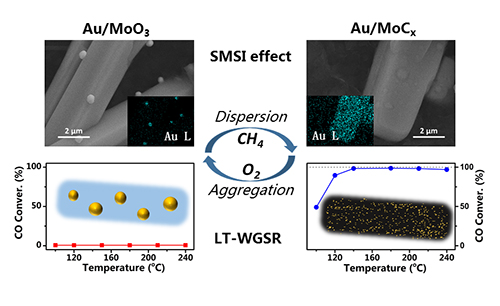Recently, a research group led by Prof. FU Qiang and Prof. BAO Xinhe from the Dalian Institute of Chemical Physics (DICP) of the Chinese Academy of Sciences demonstrated the strong metal-support interaction (SMSI) effect in molybdenum carbide-supported Au catalyst (Au/MoCx).
SMSI has been regarded as one of the most important concepts in heterogeneous catalysis. The classical SMSI phenomena are widely observed for platinum group metals (PGMs) supported on reducible oxides such as TiO2, CeO2, and Fe2O3 upon high-temperature reduction treatments.
Transition-metal carbides (TMCx) exhibit noble-metal-like electronic properties, which are promising as catalytic materials or catalyst supports in many reactions. Recently, there is a call for studies of the SMSI effect in metal/carbide systems in order to extend the important concept and to elucidate the nature of metal-carbide interactions.

Strong Metal-Support Interaction (SMSI) effect has been well demonstrated in metal/carbide catalysts induced by carbonization of metal/oxide catalysts. (Image by DONG Jinhu)
In this work, both Au catalyst and MoCx support were chosen to construct the metal/carbide interfaces. The scientists found that Au remained highly dispersed on the carbide support, interacted with the support via strong charge transfer, and more importantly showed excellent low-temperature water-gas shift reaction (LT-WGSR) activity. Oxidation treatment of the Au/MoCx catalysts led to strong aggregation of Au nanoparticles and lower LT-WGSR activity.
These results confirmed that the SMSI effect was active in metal catalysts supported on carbides, which showed reversibility under alternative oxidation and carbonization treatment conditions. In-situ characterization methods were used to study the evolution process during the carburization. It was proposed that epitaxy between Au and MoOxCy played an important role in wetting and stabilization of Au on the carbide support.
The finding opens a new territory for the concept, which is of great significance for understanding of the SMSI effect and effective modulation of catalysis over carbide-supported metal catalysts.
The above work entitled “Carbide-Supported Au Catalysts for Water–Gas Shift Reactions: A New Territory for the Strong Metal–Support Interaction Effect” was published in the Journal of the American Chemical Society.
The work was supported by the National Natural Science Foundation of China, the Strategic Priority Research Programme of the CAS, National Key Projects for Fundamental Research and Development of China, and Collaborative Innovation Center of Chemistry for Energy Materials (iChEM). (Text by DONG Jinhu)